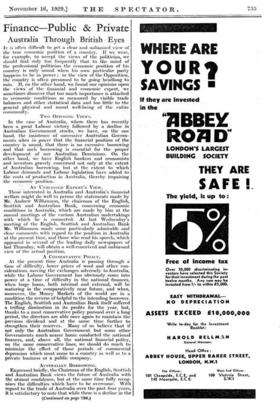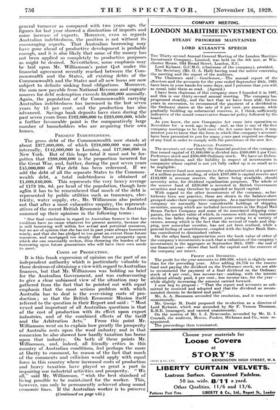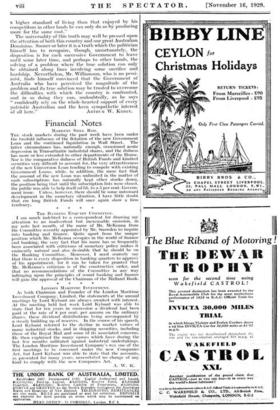Finance Public & Private
Australia Through British Eyes
IT is often difficult to get a clear and unbiassed view of the true economic position of a country. If we were, for example, to accept the views of the politician, we should find only too frequently that to the mind of the professional politician the economic position of his country is only sound when his own particular party happens to he in power ; in the view of the Opposition, the country is often presumed to be going headlong to ruin. If, on the other hand, we found our opinions upon the views of the financial and economic expert, we sometimes discover that too much importance is attached to economic conditions as measured by visible trade balances and .other statistical data and too little tothe general physical and moral well-being of the entire community.
TWO OPPOSING VIEWS.
In the ease of Australia, where there has recently been a great Labour victory followed by a decline in Australian Government stocks, we have, on the one hand, the insistence of successive Australian Govern- ments when in power that the financial position of the country is sound, that there is no excessive borrowing and that • such borrowing is essential for the proper development of our Australian Dominions. On the other hand, we have English bankers and economists and investors gravely concerned not only at the extent of Australian borrowing, but at the extent to which Labour diniands and Labour legislation have added to the costs of production in Australia,' thereby impairing the economic position.
AN UNBIASSED EXPERT'S VIEW.
Those interested in Australia and Australia's financial welfare might do well to peruse the statements made by Mr. Andrew Williamson, the chairman of the English, Scottish and Australian Bank, concerning economic conditions in Australia, which are made by him at the annual meetings of the various Australian undertakings with which he is connected. At last Wednesday's meeting of the English, Scottish and Australian Bank Mr. Williamson made some particularly admirable and clear comments with regard to the position in Australia at the present time, and those who read his speech, which appeared in several of the leading daily newspapers of last Thursday, will obtain a well-conceived and unbiassed view of the actual position.
A CONSERVATIVE POLICY.
At the present time Australia is passing through a time of difficulty, lower prices of wool and other con- siderations moving the exchanges adversely to Australia, while the Labour Government has obviously come into power at a time of difficulty in the national finances, when large loans, both internal and external, will be maturing in the comparatively near future, and when, moreover, the Money Markets of the world are in a condition the reverse of helpful to the intending borrower. The English, Scottish and Australian Bank itself suffered a trifling diminution in its profits for the year, but, thanks to a most conservative policy pursued over a long period, the directors are able once again to maintain the previous dividend and at the same time further to strengthen their reserves. Many of us believe that if not only the Australian Government but some other Governments much nearer home conducted the national finances, and, above all, the national financial policy, on the same conservative lines, we should do much to minimize the effect of those periods of commercial depression which must come to a country as well as to a private business or a public company.
AUSTRALIAN BORROWING.
Expressed briefly, the Chairman of the English, Scottish and Australian Bank views the future of Australia with the utmost confidence, but at the same time fully recog- nizes the difficulties which have to be overcome. With regard to the trade of Australia over the past four years, it is satisfactory to note that while there is a decline in the (Continued en page 788.) general turnover as compared with two years ago, the figures for last. year showed a diminution of imports and some increase of exports. Moreover, even as regards Australian indebtedness, the position is not without its encouraging aspects. That Australian borrowing may have gone ahead of productive development is probable enough, and it is also likely that some of the money has not been applied so completely to productive purposes as might be desired. Nevertheless, some emphasis may be laid upon Mr. Williamson's point tat under the financial agreement recently reached between the Com- monwealth and the States, all existing debts of the Commonwealth and the States and all new loans are now subject to definite sinking fund obligations. Moreover, the sum now payable from National Revenue and cognate sources for debt redemption exceeds £6,000,000 annually. Again, the population of • the Commonwealth carrying Australian indebtedness has increased in the last seven years by 15 per cent. and the production has also advanced. Savings bank deposits have risen during the past seven years from £162,000,000 to £225,000,000, while a further favourable point is the comparatively large number of householders who are acquiring their own homes.
PRESENT INDEBTEDNESS.
The gross debt of the Commonwealth now stands at about 1377,000,000, of which £218,000,000 was raised internally, £142,000,000 in London, and £17,000,000 in New York. But of this large total it must not be for- gotten that £288,000,000 is the proportion incurred for the Great War, and, further, during the past seven years £45,000,000 of War debt has been redeemed. If we add the debt of all the separate States to the Common- wealth debt, a total indebtedness is obtained of £1,099,640,000. This represents the very heavy average of 1178 10s. 8d. per head of the population, though here again it has to be remembered that much of the debt is represented by public utilities such as tramways, elec- tricity, water supply, etc., Mr. Williamson also pointed out that after a most exhaustive enquiry, the represent- atives of the recent British Economic Mission to Australia summed up their opinions in the following terms :
" Our final conclusion in regard to Australian finance is that her creditors have no cause whatever for present anxiety, because she is still borrowing well within her actual and potential resources, but we are of opinion that she has not in past years always borrowed wisely, and that she has pledged to too great an extent those future resources, and mortgaged too deeply that future prosperity upon which she can reasonably reckon, thus throwing the burden of her borrowing upon future generations who will have their own needs to meet."
COSTS OF PRODUCTION.
It is this frank expression of opinion on the part of an independent authority which is particularly valuable to those desirous of obtaining a view with regard to Australian finances, but that Mr. Williamson was holding no brief for the Australian Government, and was endeavouring to give a clear unbiassed view of the situation may be gathered from the fact that he pointed out with equal emphasis that the most serious problem with which Australia has to deal is the ever-rising costs of pro- duction ; so that the British Economic Mission itself referred to the question in their Report and said : " Most vexed and important of all Australian questions is that of the cost of production with its effect upon export industries, and of the combined effects of the tariff and the Arbitration Acts." From this point Mr. Williamson went on to explain how greatly the prosperity of Australia rests upon the wool industry and in that connexion he also showed how hardly taxation has borne upon that industry. On both of these points Mr. Williamson, and, indeed, all friendly critics in this country of Australian conditions, feel perhaps the more at liberty to comment, by reason of the fact that much of the comments and criticism would apply with equal force in this country where increased costs of production and heavy taxation have played so great a part in impairing our industrial activities and proiperity. " We all," said Mr. Williamson, " wish the best standard of living possible to be maintained for the worker. This, however, can only be permanently achieved along sound economic lines. If the Australian worker is to preserve
(Continued on page viii.)
a higher standard of living than that enjoyed by his competitors in other lands he can only do so by producing more for the same cost."
The universality of this truth may well be pressed upon the attention of both this country and our great Australian Dominion. Sooner or later it is a truth which the politician himself has to recognize, though, unfortunately, the disposition is for each successive Government to leave until some later time, and perhaps to other hands, the solving of a problem where the true solution can only be obtained along lines involving some sacrifice and • hardship. Nevertheless, Mr. Williamson, who is no pessi- mist, finds himself convinced that the Government of Australia who have perceived the magnitude of the problem and its true solution may be trusted to overcome the difficulties with which the country is confronted, and in so doing they can, undoubtedly, as he says " confidently rely on the whole-hearted support of every patriotic Australian and the keen sympathetic interest










































 Previous page
Previous page